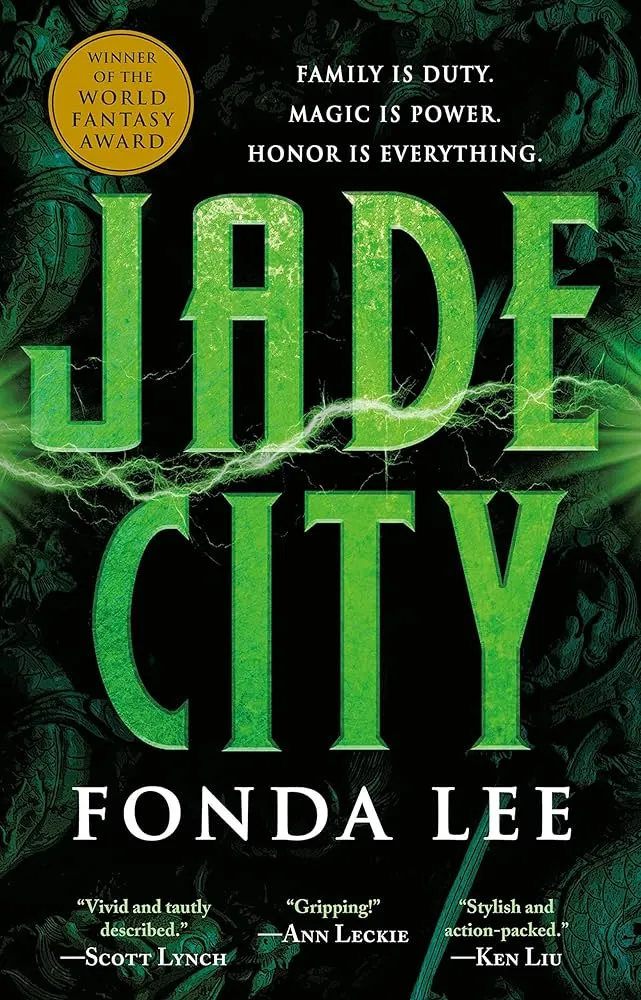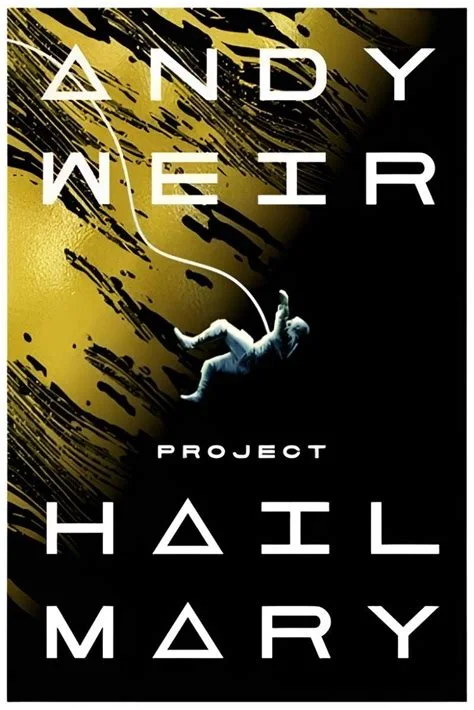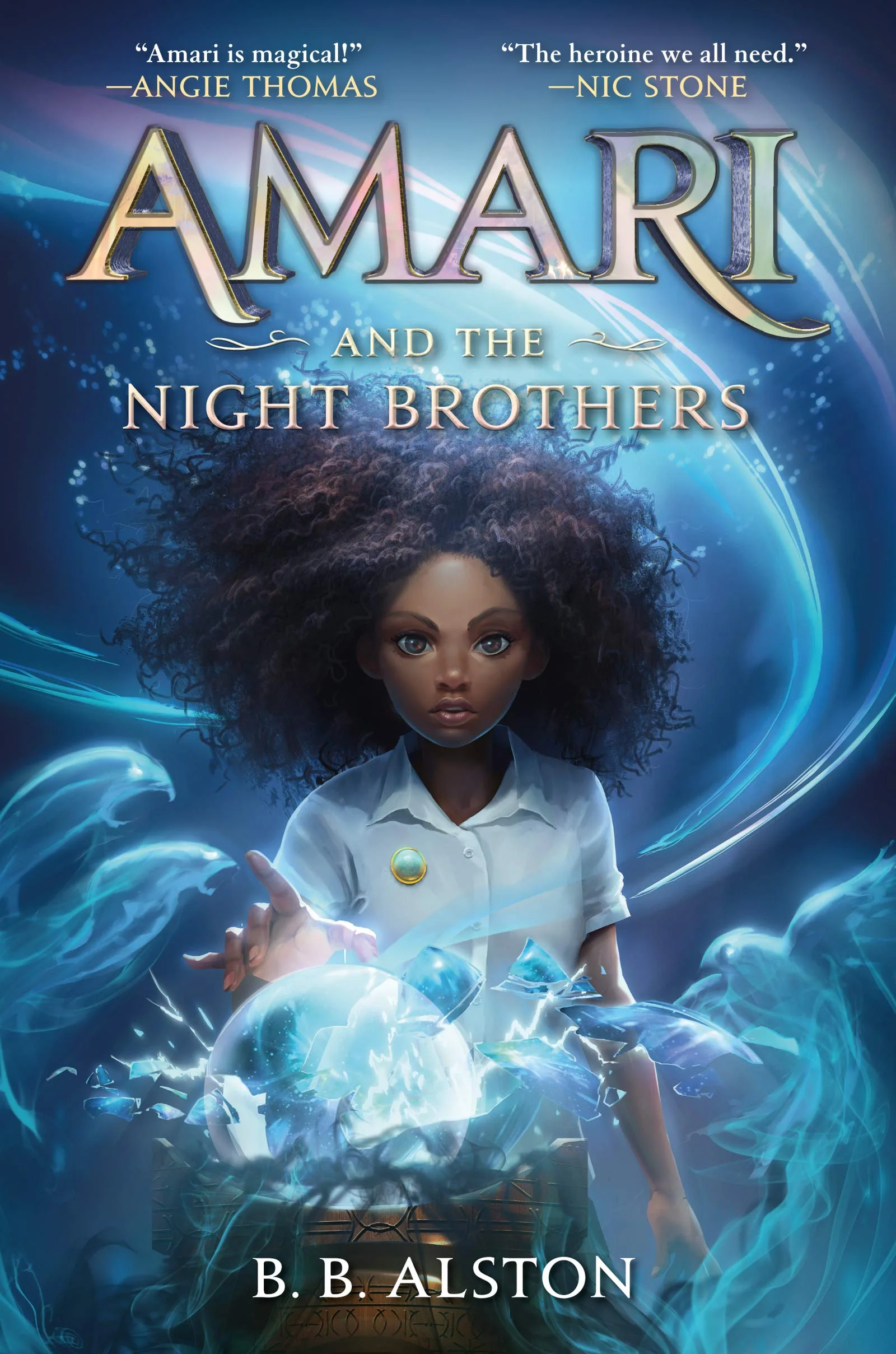My process for finding books to read is a combination of “let’s find something obscure and new” and “let’s see what others are currently raving about”. This trilogy appeared on my radar for the latter reason. For a year or so, the “Green Bone Saga” popped up everywhere, until I just couldn’t ignore it and decided to give it a shot.
I honestly barely had a clue what the books were about. I don’t like reading too much of the marketing blurb or reviews, because I feel it just gives away too much or forces certain assumptions that hinder the fresh reading experience. All I knew beforehand was that it was some sort of Game of Thrones between clans in a world where only some material called jade gives you superpowers.
That turned out to both be a very apt summary and not a good description at all.
This article is my short review of the entire trilogy of books called The Green Bone Saga. Which usually turn out to be my “general interesting thoughts about a thing” with a somewhat random score attached to it ;)
The first part of this review is spoiler free. At the end, I’ll give thoughts including spoilers.
What did I like?
The first thing I noticed was the prose. It’s very good.
When I say this, however, I do not mean purple, flowery, poetic prose. I don’t like sentences that are 100 words on average or an author trying to use words that nobody knows. I’d be hard-pressed to call that “good prose”. It’s more “I want to impress you with my intellect”-prose.
This book finds a balance between strong imagery and poetic sentences, and very functional and easy to understand prose. It’s noticeable from the start. The first chapters are very simple scenes, some action-driven and some more worldbuilding than anything, but contain just a handful of standout sentences to spice it up.
I also like the way the story is written and told in general. The author does not shy away from more complex plots, with lots of moving parts or characters stirring the pot, as opposed to a straightforward formula of going from A to B. Actions have consequences. The larger mechanisms of the world, such as economy and the opinion of the masses, is important all the time. In this way, the world also expands slowly as you get further into the story, until there’s quite a large number of characters, cities, countries, feuds, etcetera to keep track of.
To make this easy to understand, and to prevent books being 1000 pages, time jumps between chapters are frequent. One moment you’re reading the resolution of something, the next chapter it’s subtly mentioned that everyone is now 2 years older and this conflict has been brewing all that time. This allows chapters to hyperfocus on something big and interesting each time, instead of being a slow burn that merely shuffles to a climax with every chapter.
Even there, I feel the author strikes a nice balance between introspection and slower character-building chapters, and the action-packed big moments in the plot. And big moments it has, lots of them. These moments were usually exactly what they need to be: a “surprise” or a “twist”, but in retrospect it was very logical and the story had clearly been building to it.
Despite such a layered plot and large array of characters, I was always able to understand the main events and character motivations. When the final book ended, I was a bit sad to see some of them go, because you’ve obviously spend a lot of time with some main characters during the trilogy. And because of the time jumps, you actually get to see them for the majority of their life.
The way this saga thinks about storytelling—both idea and execution—just aligns really well with how I think about it or how I like it.
On top of that, it provides some unique spins or takes on its initial ideas.
There’s a lot of fighting between the clans, of course, but it never really comes close to something like Game of Thrones. Because there are really only two clans (No Peak and the Mountain), and none currently “reigns” like a king, and most scheming is pretty non-violent.
Similarly, there’s Jade which gives you supernatural abilities, but I can barely call this a fantasy. It’s extremely grounded in realism and there are clear limitations, from the start, to what Jade can do. To make this “magic” really interesting, Jade can take a toll. The clan members must be trained for years to be able to tolerate Jade, otherwise they’d succumb to terrible fates while wearing Jade. Having such restrictions is a great way to prevent lazily abusing your magic or superpowers to just do “whatever is needed for the plot”.
I’ve done quite some research on this (for Saga of Life) and have talked about this in the past. But it seems like our human brain is just incredibly finetuned to the idea of clans or tribes, and the struggles (violent or not) between them. Stories about that always seem more interesting, real and potent to me. Moreso than that of a single hero accomplishing anything or, at the other extreme, a world in which the idea of strong groups and community and family don’t matter.
What did I not like?
Here we go again. Another trilogy where each book gets progressively longer, and the final book is a bit ridiculous.
There’s this general saying of “no good story is too long; no bad story is too short”. And I do agree. I didn’t actively hate reading a longer book. The story was good, the quality stayed consistent, and I stayed interested. So why would I care that the final book is very long?
Because it’s a symptom of a bigger problem. A writer who wants to put too much into one book.
The only one or two review quotes I read (before starting the trilogy) said that the plot was “extremely complicated” or “dazzling in its complexity”. When I read the first book, I thought those reviews were nonsense. The plot was quite straightforward! Any details or worldbuilding was doled uit in nice doses, spread across the chapters. If this plot is complex, then they must think Harry Potter is incredibly convoluted too!
After reading the final book, however, I must somewhat agree. Many times, loads of names and extra details are just thrown out. I am suddenly at a paragraph about some economic tensions in a land far far away, and I just can’t remember which country it was, any other properties of it, and why I would care.
It introduces strong jade warriors, interesting concepts, new developments, only to sideline them so we can have a table discussion about terms of which I’ve forgotten the meaning. And that’s okay, because they’ll have another meeting with a big list of country names in 100 pages, and it still won’t be too important to the main story.
Another example: near the end, the book tells you the names of many new clan members (selected for important positions) in a big list. I don’t remember that! And it doesn’t matter, because we’re near the end of the story, so their names won’t come up and won’t matter. Why overwhelm me with that information then?
Of course, you can put lots of details and subplots in a story. I just said I liked these complex, layered plots where everything interacts with everything. But they will only stay simple and understandable if they matter. If you’re going to tell me the exact names of people, do it because they’re going to do important shit for the rest of 300 pages. If you’re telling me about some specific deal, or city, or person in a faraway country, do it in a natural way because the story will revolve around it.
Sometimes, the books did this perfectly! But sometimes, especially in the third book, I could feel too much stuff being added without really being core to the story. Which is why I notice the length of the book and think it should’ve been kept shorter. And which makes it feel like homework to read all those names and details. And even when I really tried to soak it in, it was just too much for my tired brain before going to bed.
This is a bit of a personal issue, I must also admit. In my own writing, I barely do any description or mention any details that will not be some core element of the story. I strongly feel that any interesting parts of your world or characters should come out naturally by having an interesting story flowing through them. I can handle some more description or flavor details, but not a big list of difficult-sounding names that I don’t care about ;)
Finally, the ending of the book is fine. I’ll talk about it more at the end (with spoilers). All I can say now, is that I can understand why the author chose it and can partially get behind it. But it just didn’t feel like a climax to me, or an ending worthy of this saga. It’s both praise and criticism at the same time: the stories were too good and the plot had too much momentum to just … go out on a bit of a wimper for the final half of book 3.
Conclusion
In the end, this is really a story about family/community and (technological or societal) progress. Not magic or supernatural ability, not a true clan war, not a mean shuffle for some throne.
The clans are viewed as barbaric and stuck in old times by the other countries. Over time, as the world “opens up”, we travel to the different countries and everything starts to influence each other. At first, only they handle and harvest Jade, believing it is theirs and must stay so. But pretty soon, other avenues are found that allow the lesser-trained people of other countries to handle Jade. Until the clans in Janloon have changed in some ways to fit in the modern times, while keeping their “family-focused” heart.
Most of the main characters we follow have different opinions on the importance of family and how to deal with it. They all have their own journey around that central theme. Entire subplots are devoted to finding a new community somewhere, or establishing new connections, or bringing someone new into the family. As opposed to some vengeful quest to kill as many of the opposing clan as possible or going on a tear with your superhuman abilities. Of course, the heavily restricted uses of Jade help here, with its interesting drawbacks. As I said, this book is very light on the fantasy.
This makes the stories more creative, unique, grounded and believable. If these books were just 1000 pages of people killing each other until one is left standing, that would have obviously been boring and repetitive.
Combine that with a layered plot, many interesting characters doing important things, well-written prose, and good pacing, and I think the Green Bone Saga is very good.
I just wish it had cut back some of the overwhelming details, shortened the third book, and written an ending that felt a bit more climactic and fitting to me.
Those were my thoughts on The Green Bone Saga as a whole.
Spoiler Barrier!
Below I’ll give some final thoughts in more detail. To do so, however, I will be giving all the spoilers!
One of the ways in which this story can handle loads of characters without being complicated, is by regularly killing some of them. I don’t know if this was a conscious choice, as their deaths are mostly quite logical and natural in the story. But if you compare the start of the story and the end … loads of important characters did not make it. And because a character could be introduced, do something important, then meet their demise, this feels really efficient in terms of storytelling and keeping the cast of characters small at any given time.
In a book where violence is to be expected, I must say that many deaths are still unexpected. There’s suddenly a big explosion, there’s suddenly X, there’s suddenly Y, and an important person dies. I don’t necessarily have a problem with it, as, in hindsight, there was always buildup and/or natural consequences. But for two clans who hate each other so much, with all people literally trained to kill and avenge, they are pretty peaceful in general and leave each other alone. I would’ve expected far more unexpected killings, far more people getting into trouble for even having a single toe in the wrong territory, etcetera. But no, most deaths occur in other ways: outside forces, explosions, suicide, punishment from the clan itself for betraying it, etcetera.
Maybe this was the setup from the start, maybe it was an issue the author noticed. When you put your clans in a stalemate like that … you have nowhere to go plotwise! And so the story looks to other countries and mostly grows and develops there over time. Because in Janloon, the clans are roughly equal in power, and they hate each other, but none actually goes so far as to take big violent swings at the other. Instead, most scheming is political, economical, societal.
I thought this was fine. I like expanding a fantasy world and discovering more aspects, of course. But I honestly didn’t care much for all those foreign relations and all those paragraphs about it and the side quests. I cared because of the character doing it, or because I knew it would end up being really important for the plot. I personally would have restricted more of the story to Janloon and the clans, changing the story and the characters to prevent such a stalemate and allow more to happen right there.
I mean, there was a war, right? For most of the books, a “Slow War” was mentioned and other countries were at each other’s throats. But it never really matters. It influences some of the minor decisions, sure. But the war never arrives in Janloon. It never has any big or meaningful impact on the story. We barely get any other details about it, which makes it more likely that my eyes glaze over whenever they start talking about this intangible, faraway war again. If you asked me why the war started, how it developed, or why it mattered … I wouldn’t be able to tell you.
On the other hand, this would’ve made it hard to have these storylines about progress and modernizing the clans. Which I also like, because I haven’t really seen it before, but it feels very natural and interesting. To this day, we have countries in our world that are basically a black box and have cut themselves off from the outside, claiming their ways are the best ways and they won’t change. That’s what Janloon felt like: they were happy with their Jade and their violent ways, and everyone else was to be kept away.
I can stand behind the general ending of the story. I’ve felt the story always built to a moment where Janloon would become more modern and open to the world. Where clans would stay about family and Jade, but drop some of their other ideas. Where the clans would either unite or only have one left standing to rule the island.
And so, an ending where they declare friendship and make peace is fine. The two new Pillars have been clearly set up to have the temperament and philosophy to do this. To be less violent than their predecessors and more thoughtful. This in itself, however, is a bit lackluster and meh. Who wants to read an entire saga, only to end on two boys walking in a garden and telling each other how they don’t care about pretty much anything and the clans will just do their own thing now?
And so the author combines it with a second “ending”. The two previous Pillars, who’ve been at each other’s throats all this time, who still want revenge and want to settle debts. They secretly plan to kill the other in different ways, which was a great good combination with the other “slower” resolution. The fact that it fails, and Ayt tricked them again and just wanted to kill everyone to assume full power herself, was fitting for her character and something I saw coming. But even then, the way it was executed and the twists there were still exciting and a worthy ending.
Hilo dying there was both sad and fitting. (Hence my statement about liking stories with time jumps where you see a large part of someone’s life. We see Hilo as a young man at the start, then he dies nearing old age at the end, and you really feel like you shared a lifetime and got to know him and see him grow.)
In truth, my problem wasn’t with the final ending. It was with the larger ending. The entire third book, or just the back half of the third book.
This series has the constant, repeating, endless vibe and hints towards full-out Jade war. All this time, you’re tense, waiting for the moment that the brittle peace breaks down and the clans start a full-out, desparate attempt to completely remove the other one. There is some light scheming, some shuffling of power, some slight retribution for acts, but you feel that something is about to explode. Full Jade war is simmering and it should be exciting.
And it never comes! Everything is very restrained. Lots of plots revolve around the economical or political technicalities in some place. As stated, many big moments are sudden and rarely even related to the clans or their fault!
(The bombing of KJA headquarters was by the Clanless. The killing of Lan in book 1 was a mistake by the overconfident Bero. The death of Ru was a freak accident. Get my point?)
And so we get this frustrating simmering pot that never boils over or reaches a longer, expected climax. Instead, people are reasonable when they shouldn’t be (for the plot or for realism), and they are unreasonable when I feel they could just think for a bit longer.
One moment they’re like: “Well, it’s clear that none of the clans bombed the place, because we were both inside. So still frenemies, right? Let’s go back to doing nothing!” And the other moment they’re like: “We have absolutely no proof that you killed Lan, but we’ll kill a bunch of your people anyways! HA! And we’ll keep believing you killed La, despite your denials, until we die because of it!”
The “big final gamble” of the Mountain’s pillar is more a technicality that you only figure out if you paid attention to a few tiny details in subplots. Another economical thing happening in another country. The fact that missing this opportunity—because No Peak foils it, quite easily I might say—would somehow completely ruin the clan also feels meh to me.
And such, I would’ve liked the third book to be a drawn-out, big stakes, climactic, quite violent, conclusion to everything that had been built up and had simmered all this time. Instead, we get a fine story that takes a far more peaceful and restrained approach, where the ending feels a bit meh.
For example, the Pillar’s kids were always positioned to be very important. They’re the future of the clan, but also the most vulnerable. I thought it was likely that some of them might do something stupid, start the war carelessly, or be the ones to actually finish it after their father died. In a story about progress and modernization, I was sure the children would eventually be all that’s left and required to figure out how to navigate a huge conflict. But … they’re not really important and a huge conflict never comes.
- Jaya was constantly portrayed as this really passionate girl with great fighting/Jade ability. But in the end? She’s pushed away to do her own thing in some other country, has one important scene, and only returns at the very end when her father has already died. She throws a very short tantrum and is then forgotten about. What was the point?
- Ru dies a senseless death before actually having an impact on the story. It was an interesting development, but also just felt like something that came out of nowhere because the author needed Hilo (and perhaps Niko) to reconsider his ways a bit.
- Niko is stoic and passive, then suddenly becomes passionate about being his own man and trying something for himself, until coming back and being stoic and passive again. They way Niko ended up with the Kauls (discovering his existence, then making a split-second decision to kill his mother and take him away) was far more interesting than anything that character ever did or accomplished.
Maybe the story just didn’t know what it wanted to be. Maybe it just couldn’t let go of the initial main characters (the Pillars, Wen, the Maik brothers, etcetera) and ended up giving them all the glory and important plot points anyway. Or maybe this was all exactly the plan, and the author just wanted to write a clan war with as little violence or fantastical elements as possible, focusing more on family and realism and political scheming. (Maybe this was meant as setup for sequels or other books? If so, I’d still criticize it, because it didn’t feel like a good hook or setup for later stories, just a mediocre ending to this one.)
I agree with her approach for most of the books. It’s just that I never feel, even in an 800 page book, that the ending was as long and impactful as it should’ve been.



